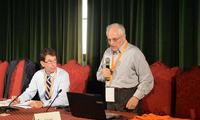
So why was the crisis so important? Because it represented a political and institutional failure, explained Martin Wolf, and also the failure of so-called "conventional wisdom". For Wolf the inability to understand what was happening and to listen to those who were warning about the possible risks was surprising. There were some dissenting voices. Wolf cited Minsky, an economist from Chicago, who had affirmed that "stability destabilises". It was a voice destined to be ignored, both before the outbreak of the crisis and afterwards. Wolf indeed observed how even in the face of the evidence and with the consequences of the crisis still having an effect today, the point of view of most economists has not changed. For Wolf it is surprising to see how many economists have not changed their views. Their inability to understand and reflect, he commented, merits the contempt of the public.
It was an extremely costly crisis, he reiterated. It caused an incredible loss of wealth that has still not been recovered. We are still experiencing the legacy today. We have lost 10 years and Italy will need another six years to recover, he underlined.
He went on to analyse the causes and spoke about the combination of macroeconomic changes and financial shocks. He recalled the exaggerated expansion of bank balance sheets and the bursting of the credit bubble. When the crisis exploded, he added, it was decided to adopt the most costly policy: banks cut interest rates and public debt was allowed to grow. In his opinion this was the right policy, even if unpopular.
What are the possible solutions? Wolf was not optimistic. He spoke about a genuine disaster, but he also tried to suggest possible routes to be taken: reviving growth, stabilising finance and rebalancing the world economy. He insisted that major changes were required. He believes it is necessary to restructure debt and stimulate offer, above all in the Eurozone. He underlined the importance of structural reforms, the contribution of universities to the innovation process and new fiscal policy. We need a better balanced world macroeconomy and less fragile finance, he reiterated.
Pressed by Giovanetti on the common currency, he said that he was against the euro because he believed that monetary union must be based on a welfare state, with a solid, reciprocal insurance system and sharing of the risk. He noted that it took the USA 100 years to get there, whereas the common European currency was created without these mechanisms to share risks. It was inevitable, he added, that it would be thrown into crisis. It was not a surprise: it was entirely predictable. In addition to creating mechanisms to share the risk, which would however be a very lengthy process, another solution could be to distinguish the rules for Germany from the rules for other European countries, because the peculiarity of European monetary union is that is has been created between sovereign states.
As regards banks, he affirmed that structural reform on a vast scale was necessary in order to avoid minor oligopolies. One of his proposals was to distinguish between investment banks and credit banks, in order to encourage more transparency by banking institutions.
-








